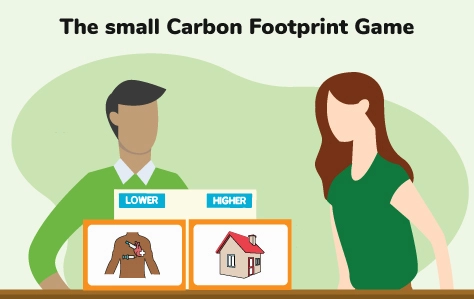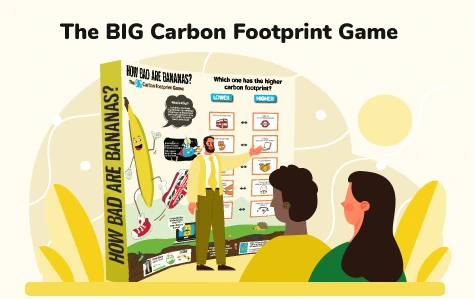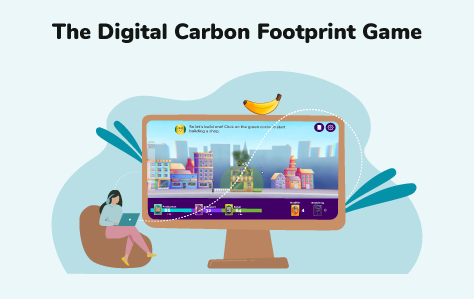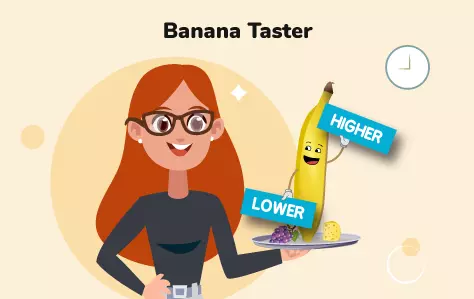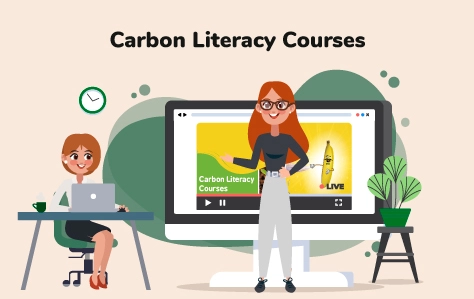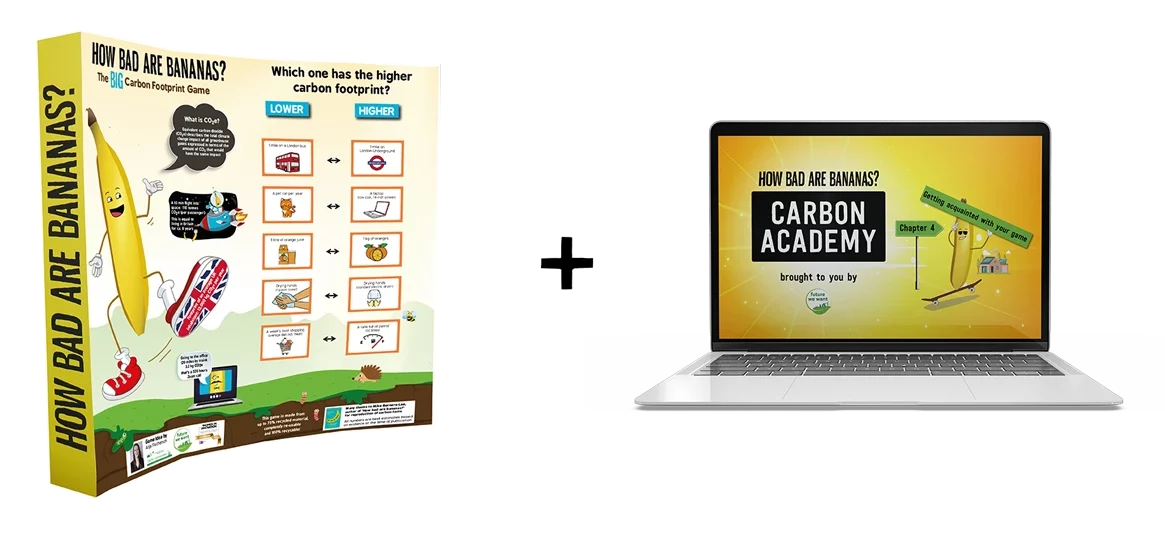The BIG Carbon Footprint Game
The BIG Carbon Footprint Game is highly eye-catching and the best way to start carbon conversations with anybody!
The game uses the science data from the book ‘How Bad Are Bananas?’ by Mike Berners-Lee to create a fun carbon footprint comparison game based on a ‘higher/ lower’ principle.
The game connects people’s actions, choices and behaviours together to empower everyone to want to make impactful choices and take action.
Perfect for events, outreach work and your everyday carbon literacy education, it’s difficult to miss when it pops up in places.
It’s a carbon conversation tool, a critical thinking developer and a fun game all delivered in an easily digestible format.
The BIG Carbon Footprint Game in action
Why Buy?
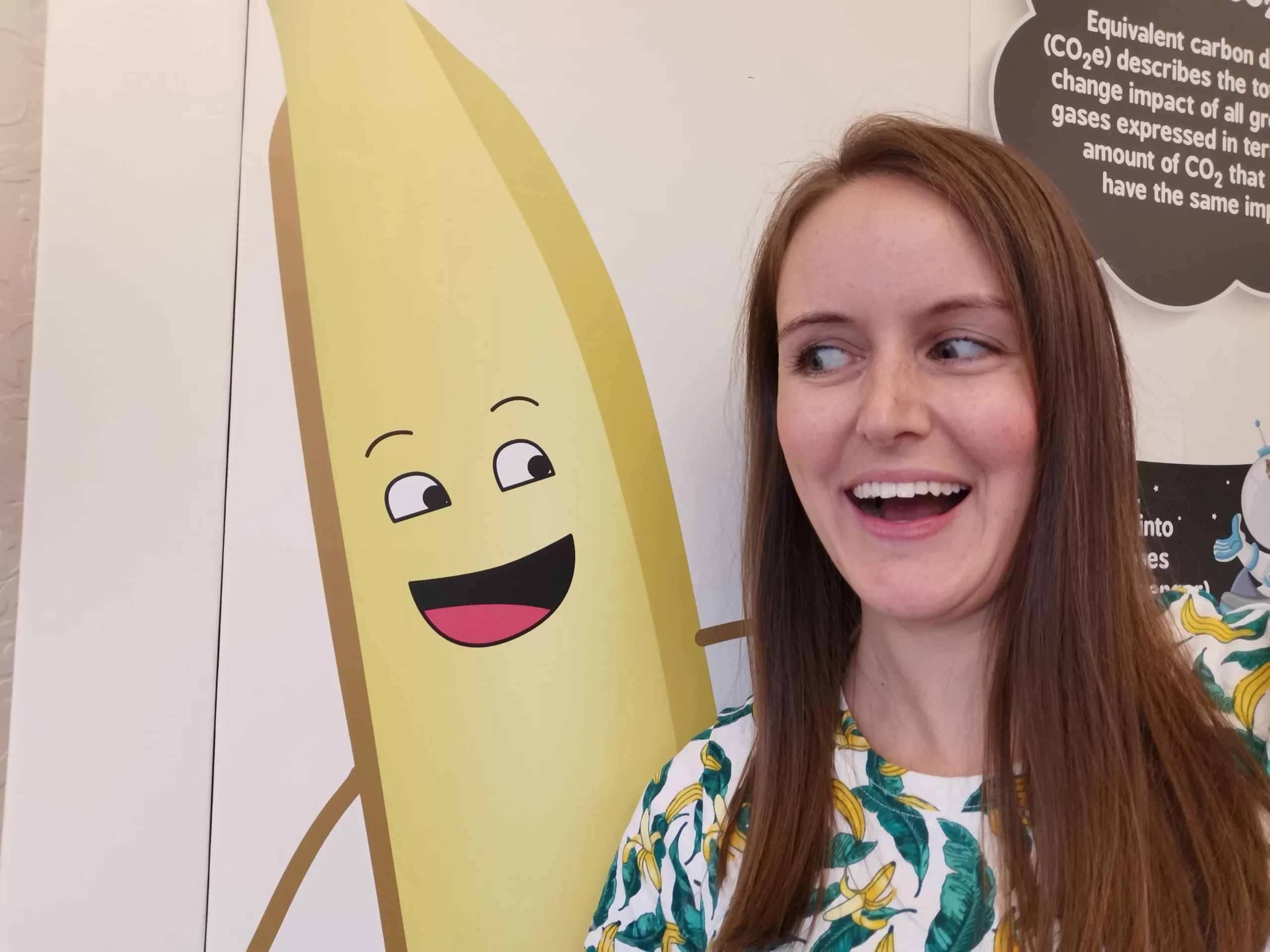
Attention Grabbing
No more sitting behind an empty table feeling invisible, with it’s eye-catching design and bright yellow banana you will be busy at your next event.
Accessible and interactive learning style
Players can personally identify with the everyday items and issues rather than coming to the learning out of context, creating a more accessible, fun, and fast approach which has a lasting learning effect.
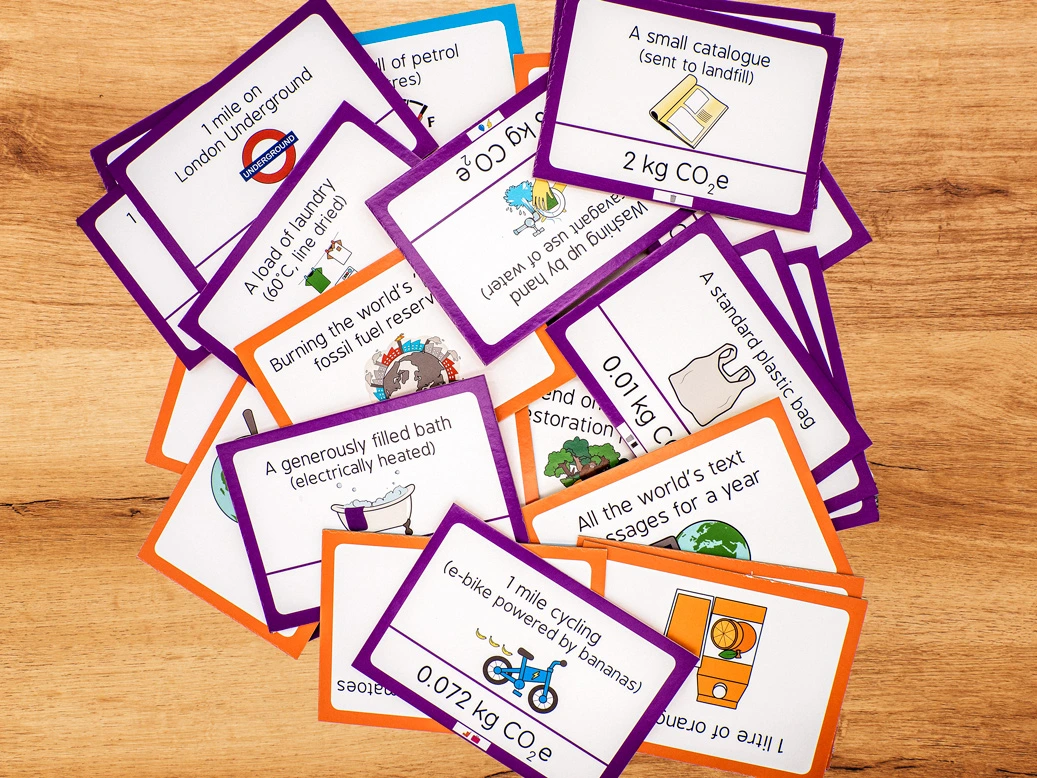
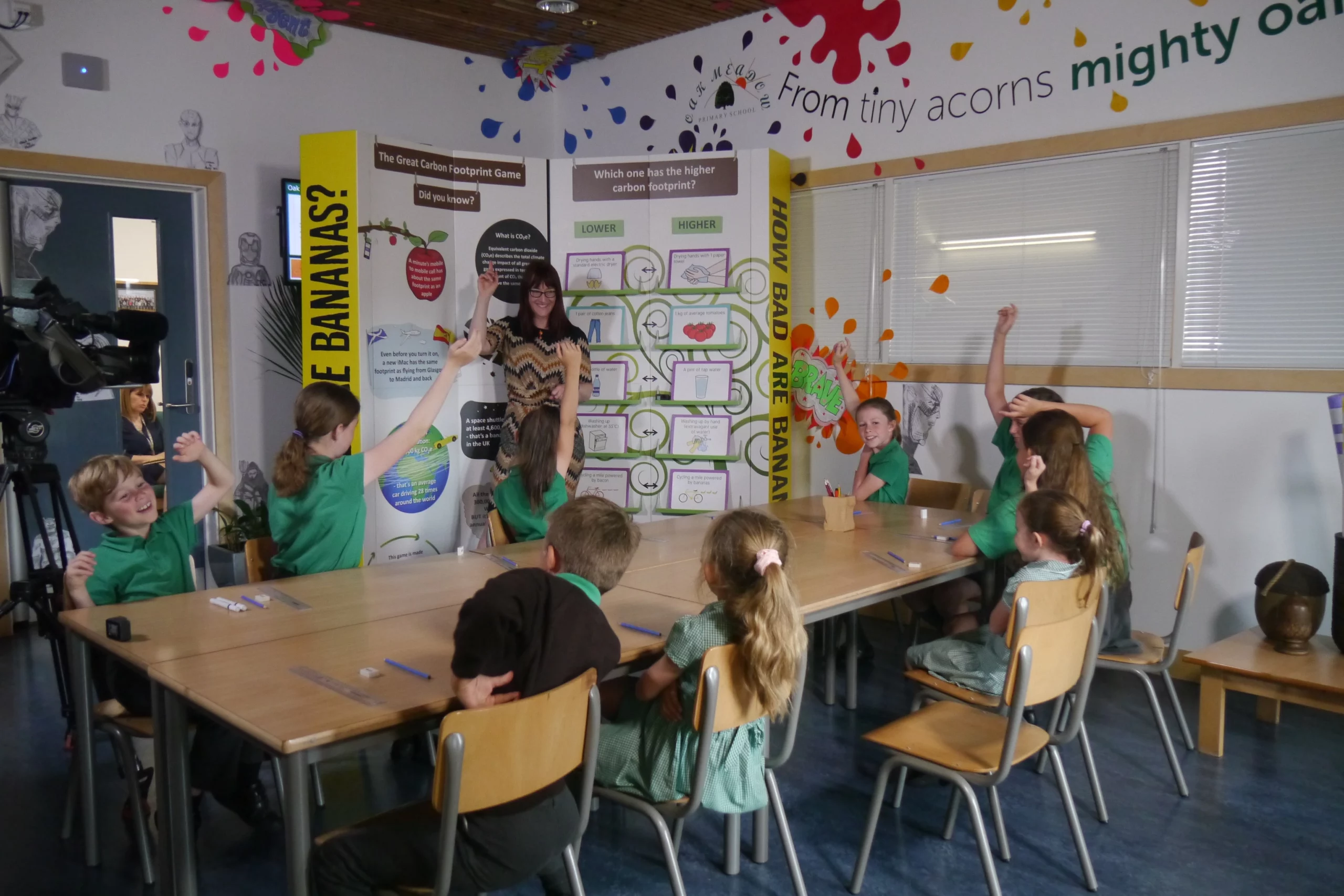
Unique carbon footprint conversation starter
Talking about climate change no longer needs to be difficult. Using relatable everyday items, the BIG Carbon Footprint Game provides an easy conversation starter into the world of sustainability for all ages.
Use the spillover Effect
People are drawn in and want to engage. You can use this to lure people into signing up to your other sustainability activities.
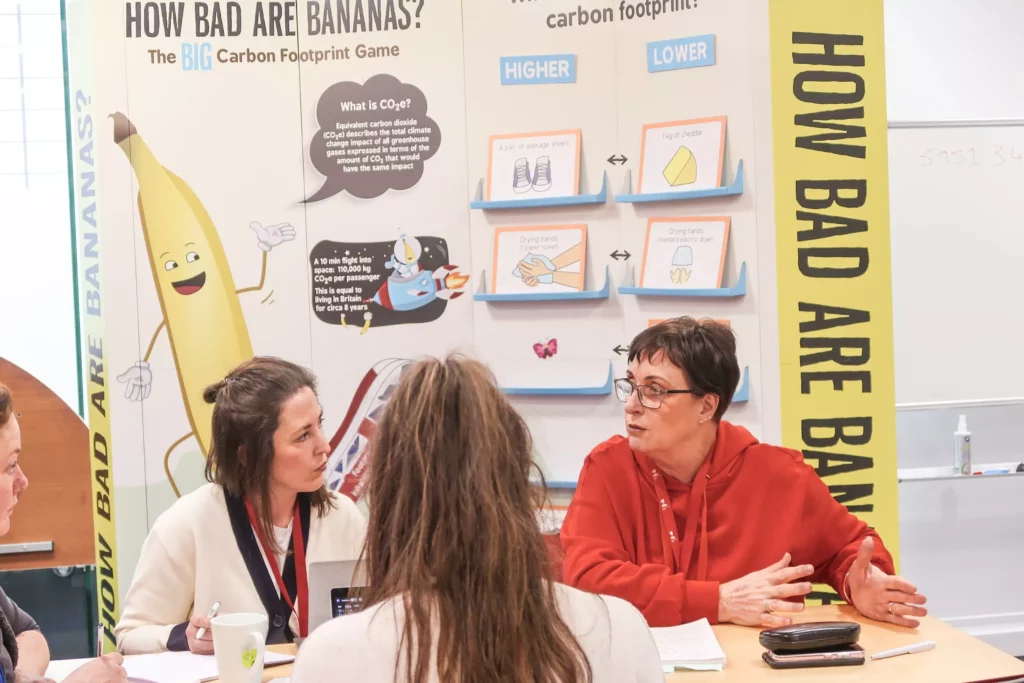
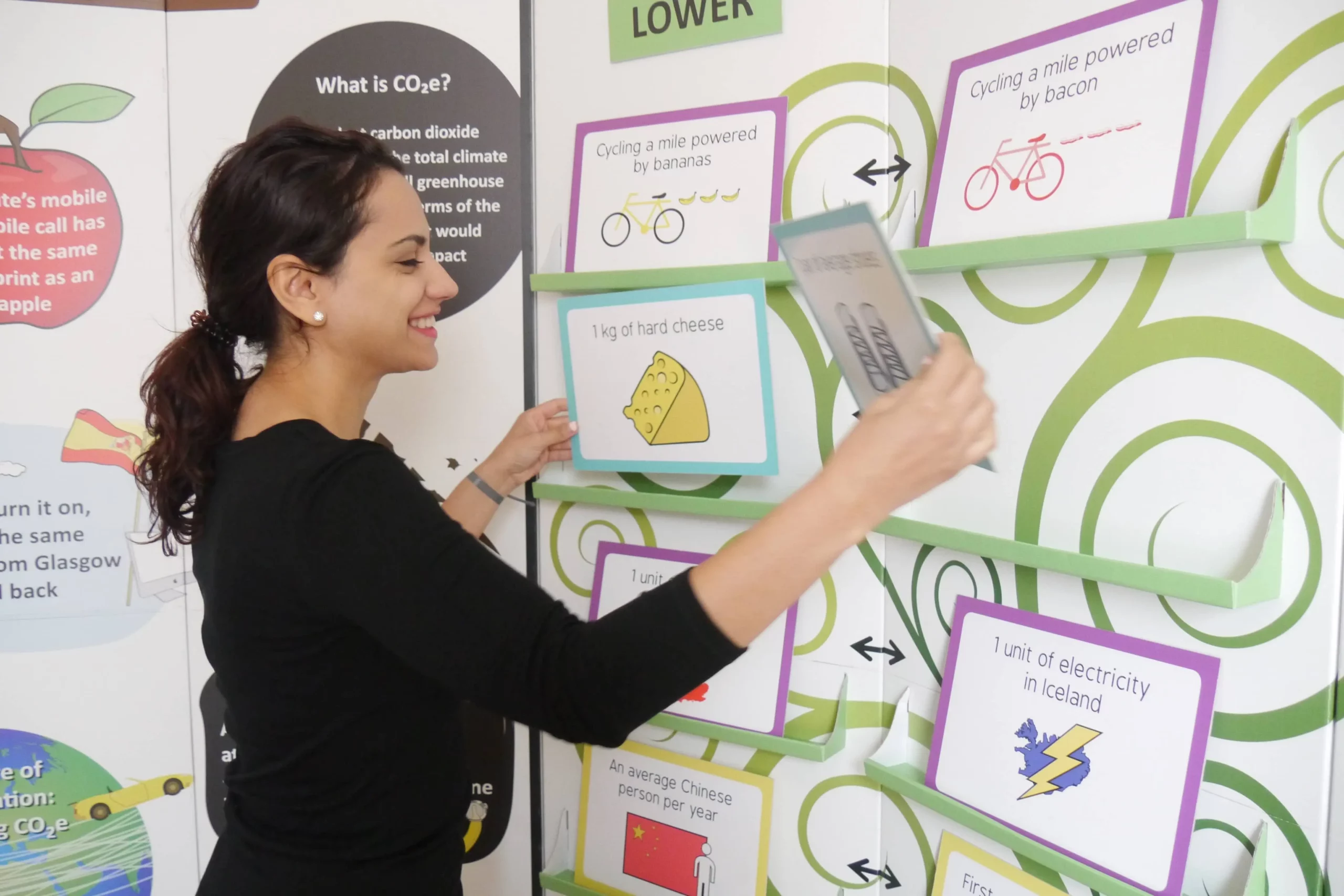
Fun
Climate education is often dull, dry and feels over complicated. The game builds on society’s love of games, putting ‘fun’ as the main objective. It connects players actions, choices and behaviours together, to empower individuals to make impactful choices.
Scientific credibility
All data used in the game comes from the book ‘How Bad are Bananas?’ book by Professor Mike Berners-Lee and is the most up-to-date compendium of carbon footprint research in the UK.
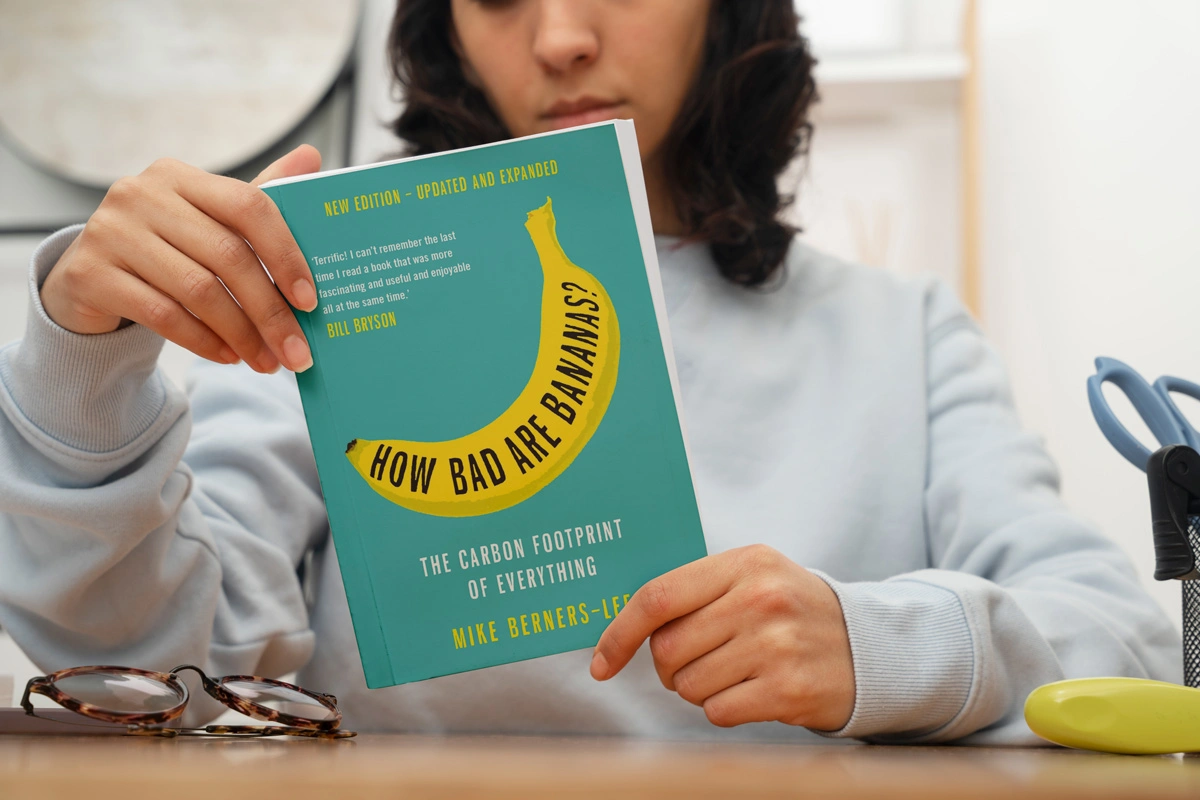
You are not just buying a game
You are buying an educational learning package disguised as a game! The BIG Carbon Footprint Game is our physical climate educator tool, teaching and engaging audiences on climate change through gamified learning. Our Carbon Academy, included with every game purchase, is our online climate educator programme, an e-learning platform that provides the skills and climate knowledge for game facilitators to confidently teach climate education and convey powerful messages that instil action.
ThE sciEncE behind the science
Climate education is a topic which is dry, poorly sold and difficult to engage people with on a deep and meaningful level.
Games are exciting, engaging and fun, and something no-one can resist getting involved in.
Gamification provides the best of both worlds, the ‘dry, poorly sold’ climate education can be made to sparkle and delivered to people in a fun, interactive and non-threatening way whilst still getting the key educational messages across.
The solution, our Carbon Footprint Games
We have turned all the carbon footprint data from the best selling book ‘How Bad Are Bananas’ by Professor Mike Berners-Lee into a simple but effective climate learning game based on science!

How does it work?
Compare cARDS
Guided by the game facilitator, players use the game playing cards to compare any pairings of everyday items, and in each pair they have to guess which item has the higher carbon footprint.
gET THEM THINKING
The comparisons are designed to get players thinking about where items come from, what makes up their carbon footprint and encourages them to use their own experiences of the world to reach an answer- creating a game that is a stealth bomb for delivering climate science!
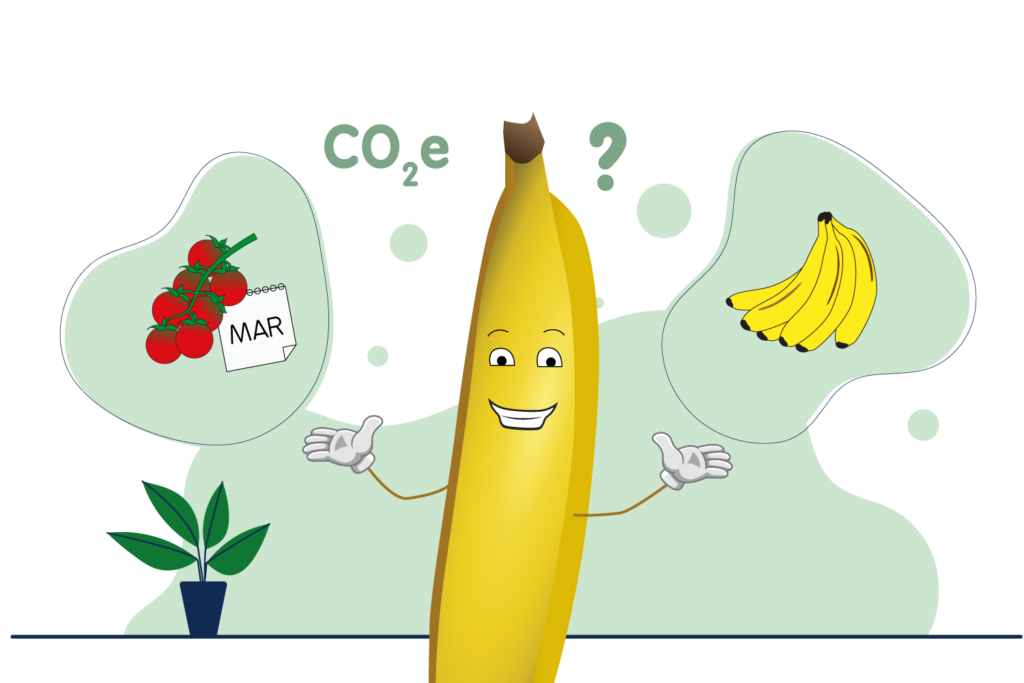
cARBON iNSTINCT
The game helps instil a ‘carbon instinct’ in players – higher impact activities become less easy to ignore and players motivate themselves to make changes.
gOOD FACILITATION IS KEY
The skill is in the delivery of the facilitator. Included in your purchase of a Carbon Footprint Game is exclusive access to our Carbon Academy, our climate educator programme, This is 3-5 hours of climate modules and resources to upskill you to become a knowledgeable climate educator and confident game facilitator.
What is included?
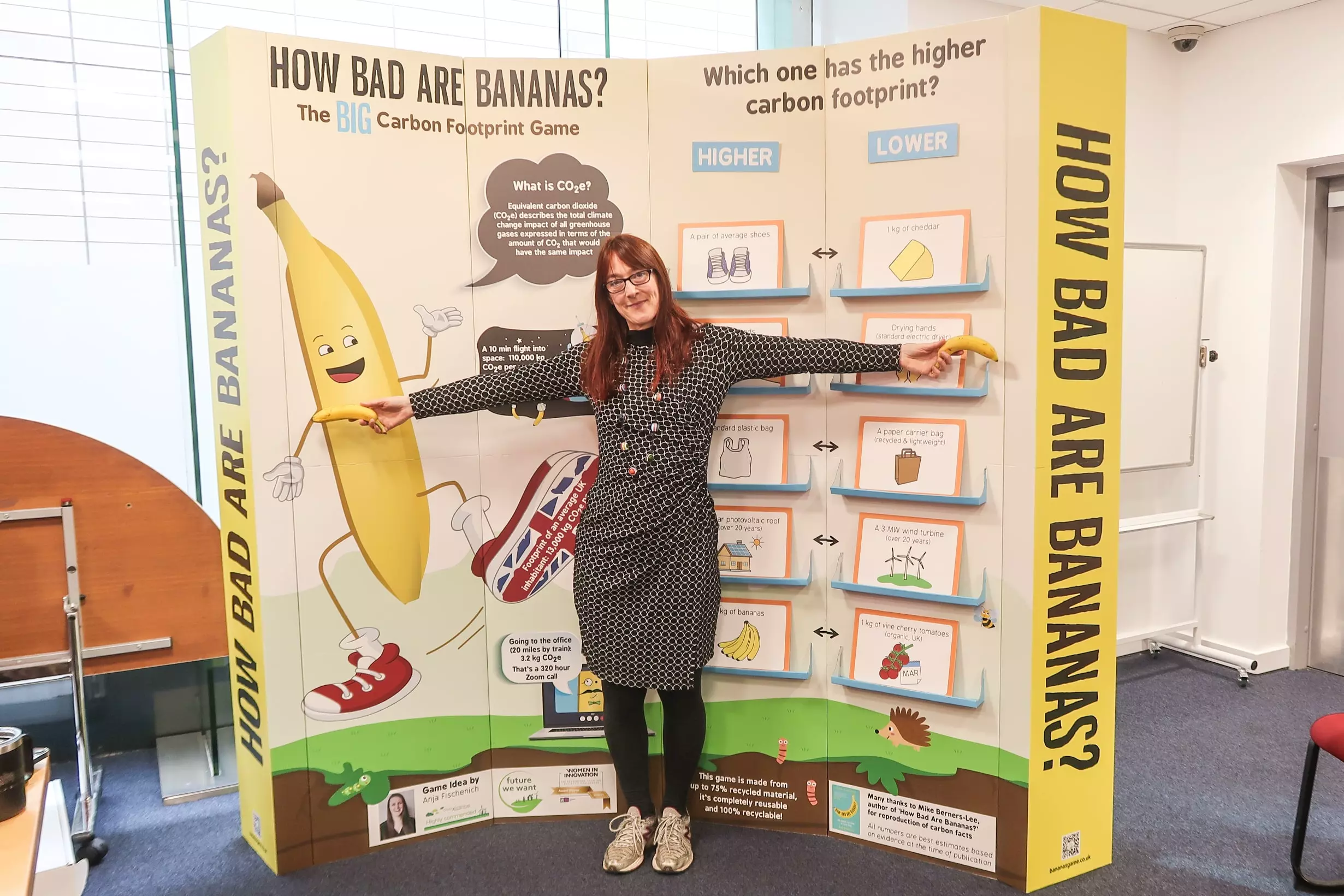
1x Big Carbon Footprint Game
Full colour Dimensions: 4m wide 3 m high Carboard stand alone structure that requires assembling. The reinforced cardboard segments slot together to create the Big Game. All packs away into a cardboard carry case.

2x Carbon Academy user licenses
- 3-5 hours guided e-learning
- Step by step game facilitation guide modules
- Climate learning/ carbon emissions modules
- Downloadable resources including cheat sheets, facilitation notes, game play critique guide
- Unlimited access to resource portal for latest game playing hints and tips
- LinkedIn accreditation
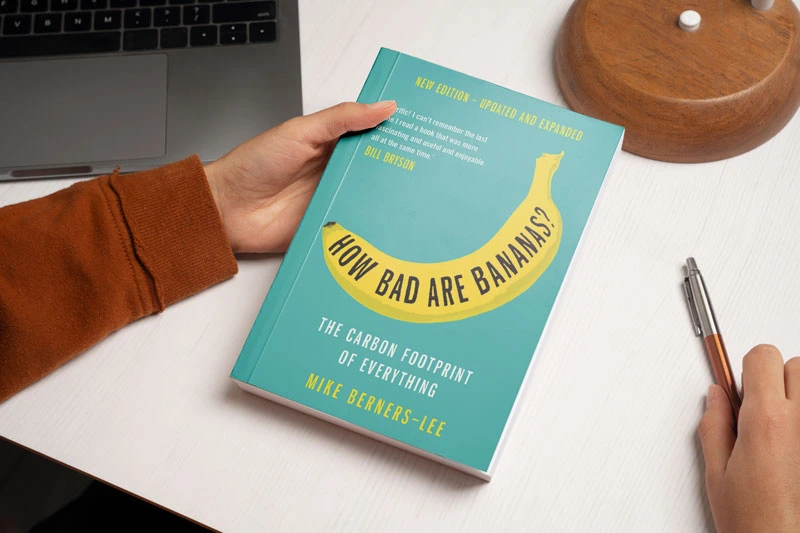
1x book 'How Bad are Bananas'
2020 version
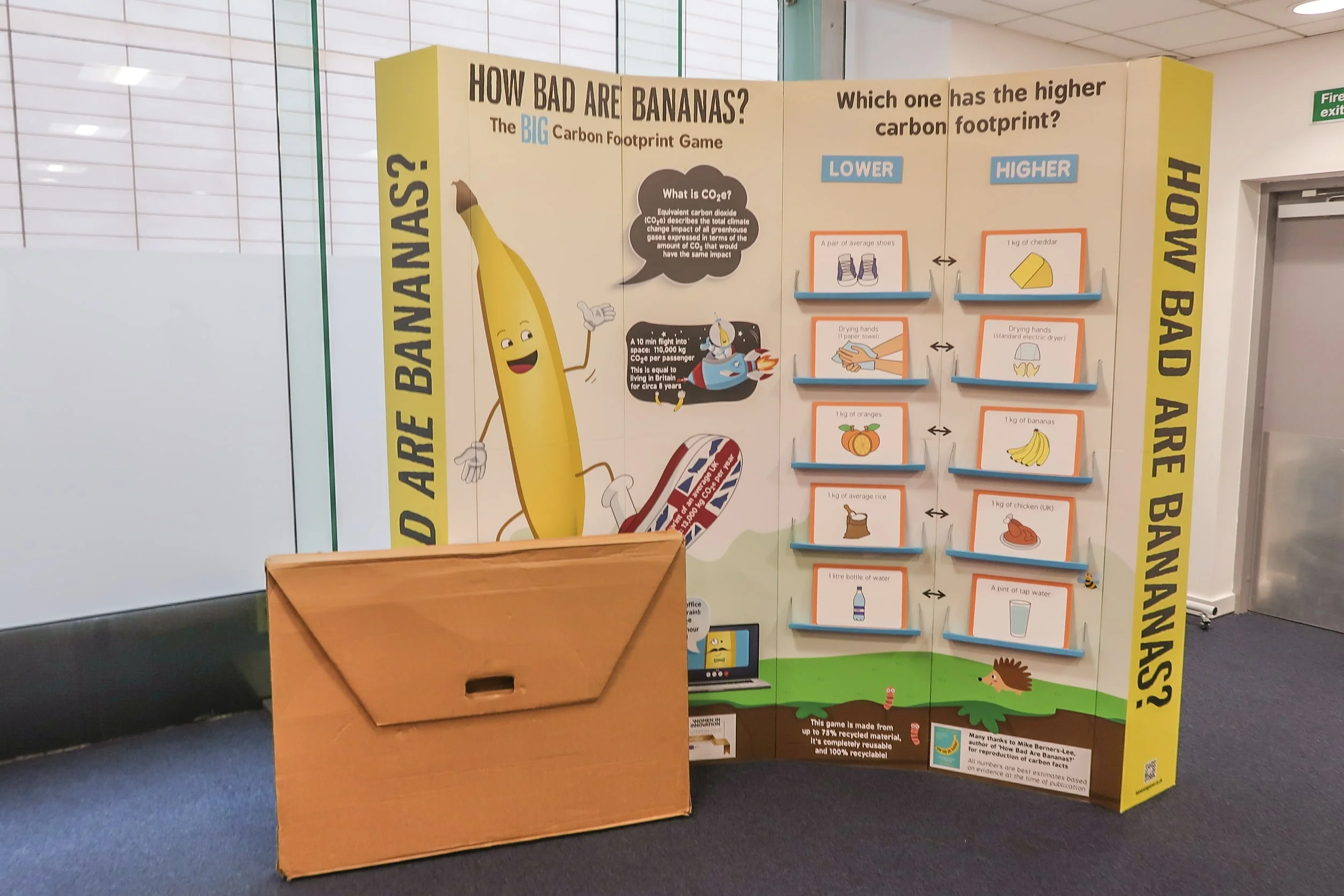
1x cardboard carry case
Cary case dimensions: 1140mm long x 850mm tall x 100mm wide
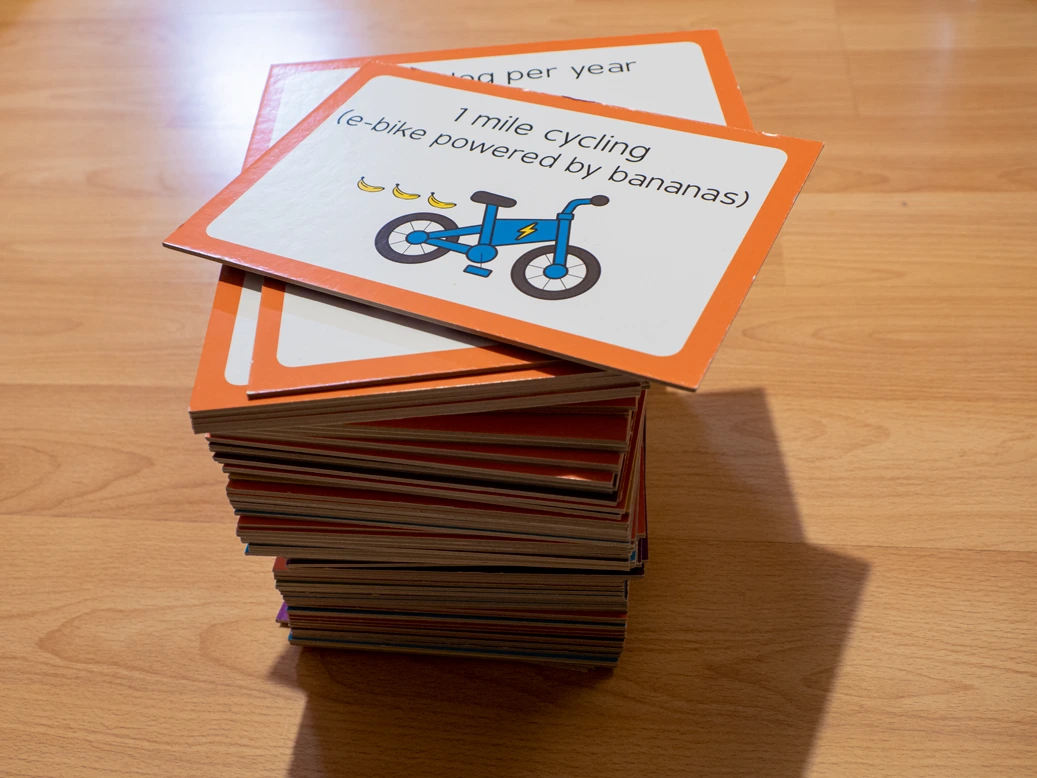
1x set of 80 game cards
Topics include: Energy, food/ drink, society, stuff, travel, water, housing, waste, solutions
Expansion pack available
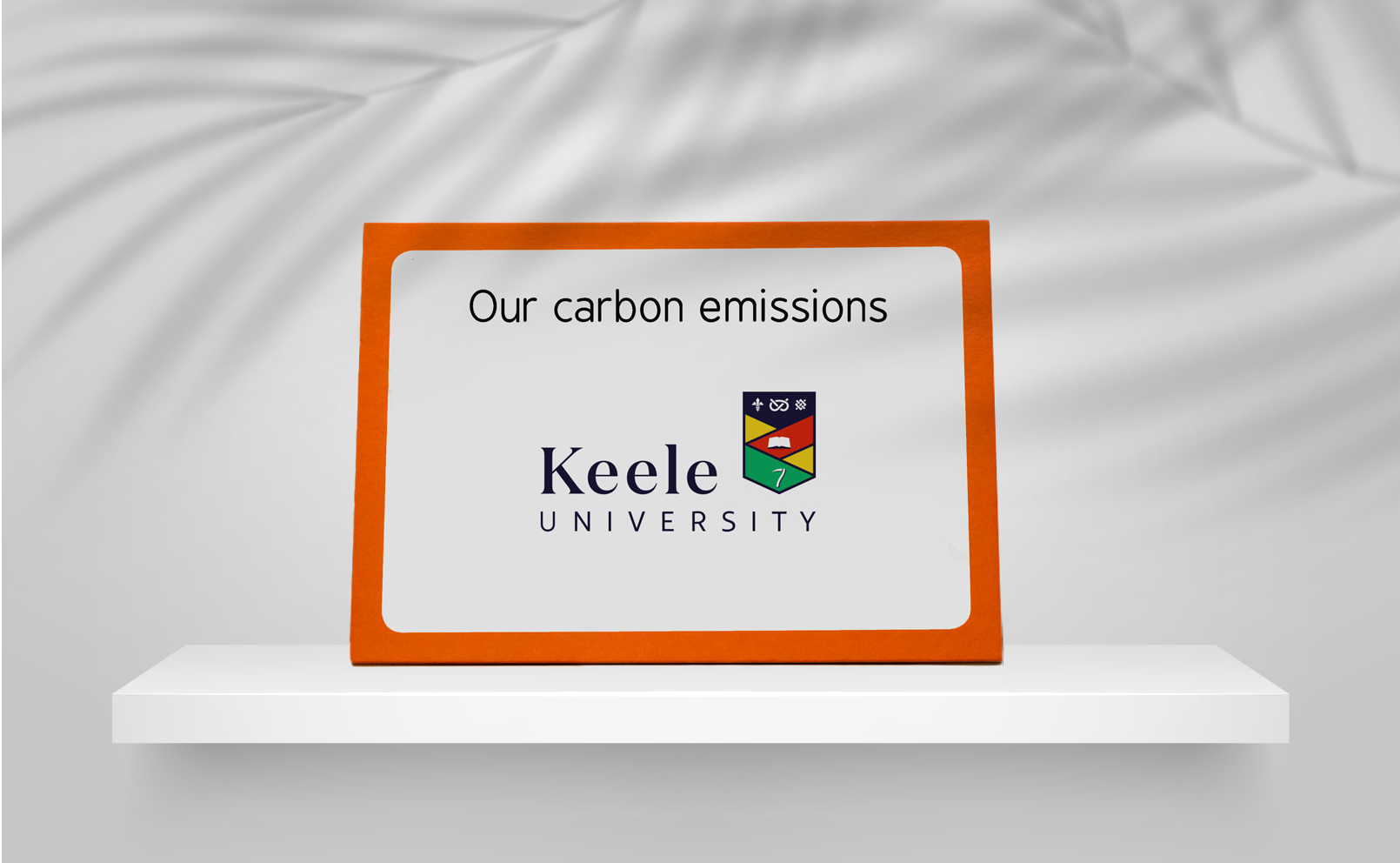
1x bespoke game card
Bespoke game card with organisation personal carbon footprint
Never feel invisible at your climate events again
Rent the BIG Carbon Footprint Game
Create a BIG impact with little stress by renting the BIG Carbon Footprint Game for all your event, strategy launch or team day needs.
Rental of the BIG Carbon Footprint Game includes a trained and experienced facilitator and consultation call to discuss how we can create the greatest learning impact.
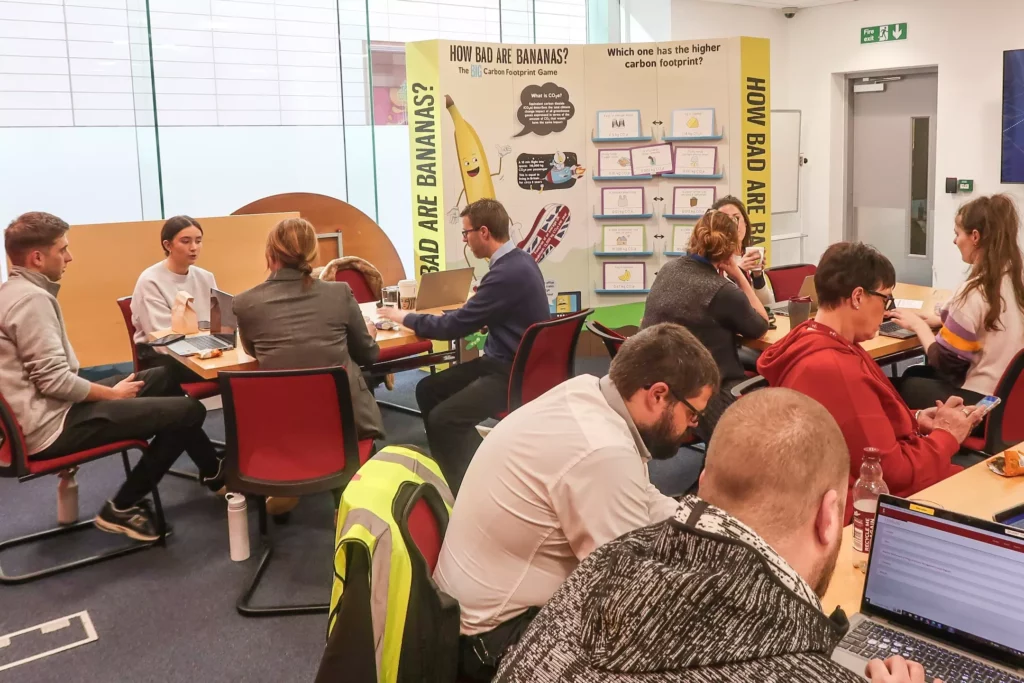
Card contents
The following cards can be used with the BIG Carbon Footprint Game.
The Original cards are included with purchase of BIG Carbon Footprint Game. The Expansion pack is available as add on.
Original
Expansion pack
-
- Energy
-
- A 3 MW wind turbine (over 20 years)
- A solar photovoltaic roof (over 20 years)
- A simple Google search
- 1 kWh of electricity (Iceland)
- 1 kWh of electricity (UK)
- Drying hands (Dyson Airblade)
- Drying hands (1 paper towel)
- Drying hands (standard electric dryer)
- All the world‘s text messages (for a year)
- Annual emissions coal mine (Woodhouse Colliery, Cumbria)
- The Cloud & the world‘s data centres (2020)
- Food/Drinks
-
- A pint of tap water
- 1 kg of carrots (local, in season)
- 1 litre bottle of water
- A pint of beer (in a pub, locally brewed)
- A large latte (cow‘s milk, disposable cup)
- 1 kg of bananas
- 1 kg of oranges
- 1 litre of soya milk
- 1 kg of aspargus (in season)
- A bottle of wine (British/French)
- 1 kg of tofu
- 1 litre of cow‘s milk
- A punnet of strawberries (out of season)
- 1 kg of chicken (UK)
- 1 kg of average rice
- A takeaway curry (4-person veggie)
- 1 kg of cod (freshly cought, UK)
- 1 litre of orange juice
- 1 kg of cheddar
- 1 kg of asparagus (flown from Peru)
- A takeaway curry (4-person meat/prawn)
- 1 kg of vine cherry tomatoes (organic, UK)
- A week‘s food shopping (vegetarian)
- A week‘s food shopping (average diet incl. meat)
- 1 kg of grapes (South Africa)
- Travel
-
- 1 mile on a London bus
- 1 mile (on London Underground
- 1 mile cycling (e-bike powered by bananas)
- 1 mile cycling (pedal powered by bananas)
- 1 mile by train (first class)
- 1 mile cycling (pedal powered by bacon)
- A night in a lavish hotel (no eco credentials)
- London to Glasgow & back (1 person, small electric car)
- A tank full of petrol (50 litres)
- London to Glasgow & back (1 person, small efficient petrol car)
- London to Hong Kong & back (1 person, first class flight)
- Stuff
-
- A weekend newspaper with supplements
- A pair of average shoes
- A pair of cotton jeans
- A new smartphone (iPhone 11)
- A pet cat per year
- A laptop (low cost, 14-inch screen)
- A pet dog per year
- Housing
-
- Refurbishing an existing house
2. Building a new house (4-bedroom detached)
- Refurbishing an existing house
- Waste
-
- A standard plastic bag
- A paper carrier bag (recycled & lightweight)
- 1 kg of average rubbish (to landfill)
- A small catalogue (sent to landfill)
- Solutions
-
- Direct air capture and carbon storage per year
- £1 spend of a rainforest restoration project
- £1 spend on solar panels
- Society
-
- An operation (knee/hip)
- An operation (heart bypass)
- An average person per year (China)
- 1000 kg nitrogen fertiliser (inefficently made & used)
- An average person per year (USA)
- Deforestation (per hectare)
- UK healthcare (total emissions)
- Global military bootprint (total emissions 2018)
- Burning the world‘s ‘proven‘ fossil fuel reserves
- Our school/our university/our company (your individual footprint on a card)
- Water
-
- Boiling 1 litre of water (electric kettle)
- 5 min showering (average electric shower)
- A load of laundry (60°C, line dried)
- Washing up (dishwasher at 65°C)
- A generously filled bath (electrically heated)
- A load of laundry (40°C, tumble dried)
- Washing up by hand (extravagant use of water)
- A 3 MW wind turbine (over 20 years)
- A solar photovoltaic roof (over 20 years)
- A simple Google search
- 1 kWh of electricity (Iceland)
- 1 kWh of electricity (UK)
- Drying hands (Dyson Airblade)
- Drying hands (1 paper towel)
- Drying hands (standard electric dryer)
- All the world‘s text messages (for a year)
- Annual emissions coal mine (Woodhouse Colliery, Cumbria)
- The Cloud & the world‘s data centres (2020)
- A pint of tap water
- 1 kg of carrots (local, in season)
- 1 litre bottle of water
- A pint of beer (in a pub, locally brewed)
- A large latte (cow‘s milk, disposable cup)
- 1 kg of bananas
- 1 kg of oranges
- 1 litre of soya milk
- 1 kg of aspargus (in season)
- A bottle of wine (British/French)
- 1 kg of tofu
- 1 litre of cow‘s milk
- A punnet of strawberries (out of season)
- 1 kg of chicken (UK)
- 1 kg of average rice
- A takeaway curry (4-person veggie)
- 1 kg of cod (freshly cought, UK)
- 1 litre of orange juice
- 1 kg of cheddar
- 1 kg of asparagus (flown from Peru)
- A takeaway curry (4-person meat/prawn)
- 1 kg of vine cherry tomatoes (organic, UK)
- A week‘s food shopping (vegetarian)
- A week‘s food shopping (average diet incl. meat)
- 1 kg of grapes (South Africa)
- 1 mile on a London bus
- 1 mile (on London Underground
- 1 mile cycling (e-bike powered by bananas)
- 1 mile cycling (pedal powered by bananas)
- 1 mile by train (first class)
- 1 mile cycling (pedal powered by bacon)
- A night in a lavish hotel (no eco credentials)
- London to Glasgow & back (1 person, small electric car)
- A tank full of petrol (50 litres)
- London to Glasgow & back (1 person, small efficient petrol car)
- London to Hong Kong & back (1 person, first class flight)
- A weekend newspaper with supplements
- A pair of average shoes
- A pair of cotton jeans
- A new smartphone (iPhone 11)
- A pet cat per year
- A laptop (low cost, 14-inch screen)
- A pet dog per year
- Refurbishing an existing house
2. Building a new house (4-bedroom detached)
- A standard plastic bag
- A paper carrier bag (recycled & lightweight)
- 1 kg of average rubbish (to landfill)
- A small catalogue (sent to landfill)
- Direct air capture and carbon storage per year
- £1 spend of a rainforest restoration project
- £1 spend on solar panels
- An operation (knee/hip)
- An operation (heart bypass)
- An average person per year (China)
- 1000 kg nitrogen fertiliser (inefficently made & used)
- An average person per year (USA)
- Deforestation (per hectare)
- UK healthcare (total emissions)
- Global military bootprint (total emissions 2018)
- Burning the world‘s ‘proven‘ fossil fuel reserves
- Our school/our university/our company (your individual footprint on a card)
- Boiling 1 litre of water (electric kettle)
- 5 min showering (average electric shower)
- A load of laundry (60°C, line dried)
- Washing up (dishwasher at 65°C)
- A generously filled bath (electrically heated)
- A load of laundry (40°C, tumble dried)
- Washing up by hand (extravagant use of water)
-
- Energy
-
- A short email
- Ironing a shirt
- 1 kWh of heat (from solar heating panel)
- An hour TV (55-inch LED screen)
- 1 kWh of heat (modern gas boiler)
- Food/Drinks
-
- A mug of tea (with cow‘s milk)
- A chocolate
- A large latte (oat milk, disposable cup)
- A loaf of bread
- 1 kg of boiled potatoes (locally grown, lid on)
- 1 kg of broccoli (Spain, Italy or France)
- 1 kg of avocados (Peru, Chile)
- A box of 6 eggs
- A 10-inch pizza (pepperoni & cheese)
- A 4-ounce cheeseburger
- 1 kg of fresh trout
- 1 kg of lamb
- 1 kg of beef (UK)
- 1 kg tiger prawns (Thailand)
- A week‘s food shopping (vegan)
- Travel
-
- 1 mile by electric scooter
- 1 mile driving by electric car
- 1 mile supermarket delivery (diesel van)
- 1 mile by average petrol car
- 1 mile on a congested road (by car)
- A night in a hotel (average eco credentials)
- London to Glasgow & back (1 person, train)
- London to Glasgow & back (1 person, plane)
- London to Glasgow & back (1 person, SUV)
- Small petrol car (Citroen C1)
- A write-off car crash on an empty road
- Small electric car (Renault Zoe)
- Stuff
-
- A disposable nappy
- A reusable nappy
- A book
- A bunch of 15 mixed flowers (grown outdoors, UK)
- An ebook reader (Kindle)
- A bunch of 15 roses (Kenyan/Dutch)
- Christmas excess per adult
- Housing
-
- Insulating a loft (over 20 years)
- 1 kg of virgin general steel
- 25 kg of ‘green‘ cement alternative
- 25 kg bag of average cement
- Waste
-
- A takeaway aluminium tray (washed and recycled)
- A takeaway aluminium tray (not washed, general waste)
- 1 kg of garden waste
- 1 kg of PET plastic (recycled)
- 1 kg of average plastic
- 1 kg of waste (aluminium & copper)
- Solutions
-
- UK Reforestation (per hectare, over 200 years)
- Replanted seagrass (per hectare/year after 15 years)
- Society
-
- Having a child (average)
- Having a child (carbon conscious)
- The Football World Cup (average 2010-2018)
- All the world‘s volcanoes per year
- The UK (greenhouse gas emissions (within borders)
- The UK (greenhouse gas emissions (incl. Imports)
- Global wildfires in 2019
- Black carbon per year
- Greenhouse gas emissions caused by humans in 2018
- A short email
- Ironing a shirt
- 1 kWh of heat (from solar heating panel)
- An hour TV (55-inch LED screen)
- 1 kWh of heat (modern gas boiler)
- A mug of tea (with cow‘s milk)
- A chocolate
- A large latte (oat milk, disposable cup)
- A loaf of bread
- 1 kg of boiled potatoes (locally grown, lid on)
- 1 kg of broccoli (Spain, Italy or France)
- 1 kg of avocados (Peru, Chile)
- A box of 6 eggs
- A 10-inch pizza (pepperoni & cheese)
- A 4-ounce cheeseburger
- 1 kg of fresh trout
- 1 kg of lamb
- 1 kg of beef (UK)
- 1 kg tiger prawns (Thailand)
- A week‘s food shopping (vegan)
- 1 mile by electric scooter
- 1 mile driving by electric car
- 1 mile supermarket delivery (diesel van)
- 1 mile by average petrol car
- 1 mile on a congested road (by car)
- A night in a hotel (average eco credentials)
- London to Glasgow & back (1 person, train)
- London to Glasgow & back (1 person, plane)
- London to Glasgow & back (1 person, SUV)
- Small petrol car (Citroen C1)
- A write-off car crash on an empty road
- Small electric car (Renault Zoe)
- A disposable nappy
- A reusable nappy
- A book
- A bunch of 15 mixed flowers (grown outdoors, UK)
- An ebook reader (Kindle)
- A bunch of 15 roses (Kenyan/Dutch)
- Christmas excess per adult
- Insulating a loft (over 20 years)
- 1 kg of virgin general steel
- 25 kg of ‘green‘ cement alternative
- 25 kg bag of average cement
- A takeaway aluminium tray (washed and recycled)
- A takeaway aluminium tray (not washed, general waste)
- 1 kg of garden waste
- 1 kg of PET plastic (recycled)
- 1 kg of average plastic
- 1 kg of waste (aluminium & copper)
- UK Reforestation (per hectare, over 200 years)
- Replanted seagrass (per hectare/year after 15 years)
- Having a child (average)
- Having a child (carbon conscious)
- The Football World Cup (average 2010-2018)
- All the world‘s volcanoes per year
- The UK (greenhouse gas emissions (within borders)
- The UK (greenhouse gas emissions (incl. Imports)
- Global wildfires in 2019
- Black carbon per year
- Greenhouse gas emissions caused by humans in 2018
Create meaningful engagement around climate change
Happy Clients





























